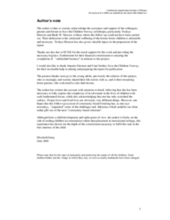This account of efforts to re-build a life for children who had lost their homes and families is set in the context of the devastating famine in Ethiopia during the years 1984-86/87. It is estimated that one million people perished as a result of this tragedy.
For political reasons, the reality of widespread hunger was denied by the ruling regime at that time. However, the renowned film made by the late Ahmed Amin for the BBC in 1985 revealing the unfolding human tragedy from the relief camps in Wollo, northern Ethiopia, shocked the world into action. The international humanitarian community poured into Ethiopia with food, vehicles, medicines and all the accompanying trappings of a large scale emergency response. Too late for thousands, the collective action nevertheless saved further thousands from certain death by starvation. Critical analyses of the emergency response have since been made by several organisations and individuals. This report will only focus on one aspect of the consequences of famine: the children who are left behind.
The Save the Children Alliance Co-ordinating group on children in armed conflict and disasters had been concerned for some time that the organisation lacked documentation on the longer-term outcomes for fostered children, as well a more in-depth knowledge on which factors promoted good care for children, and which ones predicted poor care and possible breakdown of relationships.
In 2001 members of the Save the Children Alliance from Sweden, United Kingdom and Norway formed a task group “Care and Protection of Separated Children in Emergencies” (CPSCE) and embarked on a two-year project of research and documentation on the Save the Children Alliance experience with care arrangements for children separated from parental care during emergencies. Save the Children Sweden led this group, and were the main source of funds.
Of central importance to this effort was the focus on hearing directly from children themselves. Most of the studies and cases come from war-afflicted countries, but a study was also commissioned from Malawi on foster care of children affected by the Aids pandemic. The study in this report arises from the context of famine and war, and is Save the Children Norway’s contribution.
David Tolfree, an international expert in the area of separated children and their care, was hired by the Task Group to co-ordinate and at times carry out the research, and finally to compile the research findings in his book “Whose children? Separated Children’s Protection and participation in emergencies,” published in 2004. It is highly recommended that those who wish to obtain a broader view of the issue of care arrangements for separated children read this compelling book.
©Save the Children Norway

